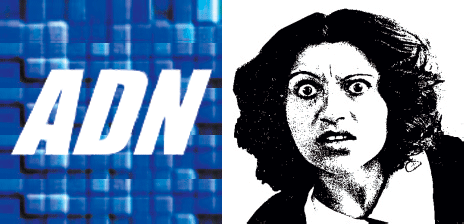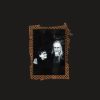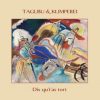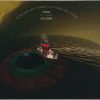Cosmofonia Rudimentale – Bolero Futurista
What about this Cosmofonia Rudimentale? Well, we have here a group of friends who liked to improvise together around 2010 in studio and on stage. The “excuse” was to create a music that could accompany futurist poetry. Roberto Zanisi is a polymorphous musician playing a lot of ethnic string instruments who collaborated between others with Amy Denio, Giovanni Venosta, David Moss, Sainkho Namtchylak and Fabien Guyot. Valerio Scrignoli is an important guitarist of Italian jazz scene who also plays rock. Carlo Nicita is a classical trained flutist who plays jazz, rock and improvised music, he is considered as one of the best Italian jazz flutists. Daniele Longo is a talented keyboard player who went through every kind of music. This double CD slept for around a decade in some hidden place and gives us the opportunity to listen to Cosmofonia Rudimentale in both versions live and studio. The studio CD opens with “Embryonic Cosmo” featuring some out-of-control lyrics sustained by a musical tapestry where organ and flute are the main actors. “Fuga da Calcutta” is pervaded by something near to an Indian feeling. “Bolero Futurista” is a long track, introduced by a vocal gimmick remembering Magma, dominated by keyboards evolutions bringing us back to the seventies. “La lava cha cha” has a quiet start based on the flute of Nicita with a intense final with all the instruments taking part to the music. “Auanagana” introduced by a guitar remembering Pink Floyd integrates texts and music in a sonorous path with a lot of curves and u turns. ”Traffik” starts in a rhythmic way slowly dissolving in a twisted climate. “Armenian Prayer” based on organ and guitar slowly moves around a prayer text. The live CD opens with “Desert Encounters” that was already featured on the compilation “Out of Standard” Italia 7 proposes a wider integration between text and music creating an oblique feeling that helps the live creativity of the group. “Taranta Raga” is the longer piece of the 2 CD’s and it can be considered a suite where all musicians express at turn their skills. “Corso Venezia 23” flows slowly in a sonorous fresco more and more complex with percussion and organ in evidence. “Sarpa Salpa” takes its name from a hallucinogen fish (if eaten it causes the same effects of LSD for a couple of days) the piece develops between voices, little voices and music inserts. “Tuareg plastic bag” whirls around a barely ethnic percussive sequence. “Tamburi delle midolle” has also a vaguely percussive soul with a lot of effects. This musical adventure lasts around 140 minutes and grants a lot of surprises and the consciousness to navigate in a futurist sea on a boat that was built in the seventies.
Lead (Woasches)
Cosmofonia Rudimentale sind (waren?) Roberto Zanisi, Valerio Scrignoli, Daniele Longo und Carlo Nicita, die zumindest in Italien in Jazz- und Improvisationskreisen einen Namen haben, bisweilen aber auch in experimentell-rockigen Gefilden tätig sind. Irgendwann im Jahre 2010 taten sich die vier zusammen, um krautig-weltmusikalisch-jazzig-rockige Musik zu machen. Dabei entstanden in nämlichem Jahr in einem Tonstudio in Seveso bei Mailand, und bei einem Konzert im Teatro Litta in der lombardischen Metropole allerlei Aufnahmen, die aber erst 2018 vom italienischen Label Alma De Nieto auf einer Doppel-CD namens “Bolero Futurista” veröffentlicht wurden. Ob das Projekt nach 2010 noch tätig war, oder gar noch existiert, ist mir allerdings nicht bekannt. Irgendwelche Informationen zu der Formation die sich nicht auf das hier rezensierte Album beziehen, sind im Weltweiten Netz jedenfalls kaum zu finden.
Eine bunte, vermutlich (vielleicht) weitestgehend improvisierte Mischung aus (Prog)Rock, Ethnoeinsprengseln, Jazzigem und freierem Klangbasteln wird auf “Bolero Futurista” geboten, bestimmt von Flötentönen (oft effektverfremdet), vielseitigen E-Gitarrensounds, weiterem Geklampfe, allerlei Tastenklängen (oft klassischem Georgel und E-Piano), Elektronischem, Perkussion und diversen Geräuschen und Tönen vom Band. Große Unterschiede in Bezug auf Sound, Herangehensweise und Instrumentarium sind zwischen dem Studiomaterial und den Liveaufnahmen nicht festzustellen. Vielleicht ist man live eine Spur dynamischer zu Gange. Zuschauerreaktionen sind auf CD2 allerdings nicht auszumachen.
Jazzrock, Krautiges, Elektronik, Free-Rock, Retrofragmente (bisweilen gar Zeuhlartiges), Ethnoverzierungen und freieres Klangbasteln werden hier jamartig vermengt, sehr abwechslungsreich arrangiert und instrumentiert. Dabei bleibt die Musik erstaunlich gut verdaubar, wird es nie wirklich wüst oder laut, obwohl das klangliche Ergebnis natürlich ausgesprochen unkommerziell und eigenständig ausgefallen ist. Munteres Rocken löst sich mit sperrigem Wuseln ab, mit kosmischem Schweben, weltmusikalischem Elektrojazz, fast retroprogressivem Schwofen, fetten Orgelexkursen (die gelegentlich in antike Hardrockgefilde geraten – man höre z.B. das lange “Taranta Raga” nach knapp 10 Minuten), Klassikzitaten, krautigen Elektronik-Flötengespinsten, modernem Geprogge, das bisweilen ein wenig an die rezenteren Klangerzeugnisse aus dem King-Crimson-Umfeld erinnert, und schwungvollen jazzig-rockigen Jameinalgen, bisweilen unterbrochen von kurzen, musikalisch untermalten Gedichtvorträgen oder Rezitationen (die sich aber gut in das Gesamtgefüge einbinden). Sehr dynamisch ist das Quartett am musizieren, gutgelaunt, kreativ und farbig.
“Bolero Futurista” ist ein ziemlich unterhaltsames Album mit progressiven Exkursen zwischen Jazz, Rock, Weltmusik und Experiment. Das Ganze ist ausgesprochen gelungen, mitreißend und erstaunlich rund ausgefallen, wird nie langweilig und ist – wie schon angedeutet – weitaus weniger anstrengend und schräg als man vielleicht annehmen könnte. Eine Art retromoderner, melodisch-klangvoller Freiformprog ohne große stilistische Eingrenzungen wird da geboten, der alles in allem viel Spaß macht.
Wertung: 11/15
Achim Breiling (Babyblaue Prog-Review) 13/04/2020



